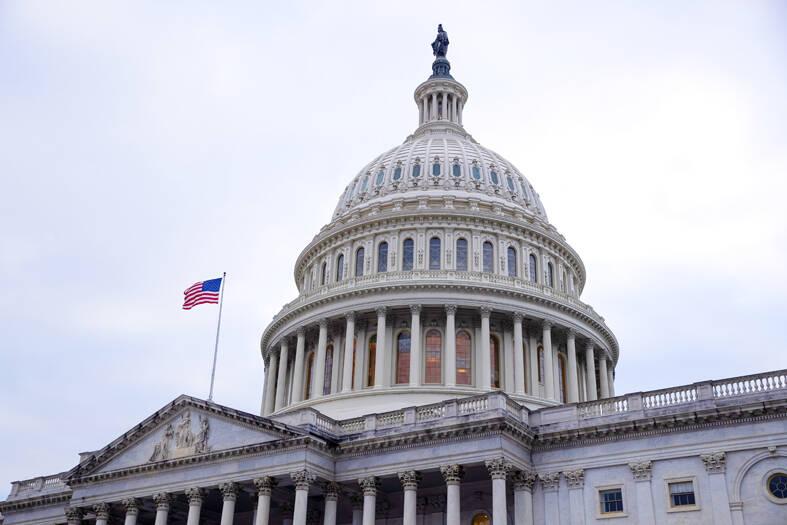The US House of Representatives yesterday passed a bill that seeks to deter Chinese military action by exposing the corruption of Chinese Communist Party (CCP) officials in the event of military action against Taiwan.
This bipartisan Taiwan Conflict Deterrence Act was introduced in early February by Republican Lisa McClain and Democrat Brad Sherman, targeting members of the CCP's Politburo Standing Committee and other senior officials whose duties involve matters related to Taiwan.

Photo: EPA-EFE
The bill requires that "the Secretary of the Treasury publish a report on financial institutions and accounts connected to senior officials of the People's Republic of China, to restrict financial services for certain immediate family of such officials, and for other purposes."
The bill authorizes the US treasury secretary to prohibit CCP officials from accessing funds in US financial institutions, and requires that an unclassified summary or portions of the report be made public on the US Department of the Treasury Web site and social media accounts in Chinese and English.
The bill also requires the treasury secretary to prohibit financial institutions from conducting significant transactions with the immediate family members of the aforementioned officials.
"The United States cannot afford to be complacent in the face of growing Chinese aggression," McClain said before the bill's voice vote.
"As a proud representative from the state of Michigan, a state that knows the value of manufacturing, trade and international stability, I know firsthand how vital peace in the Indo-Pacific to American jobs and our economy is," she said.
The Republican lawmaker later described Taiwan as a democratic partner and a key player in the global supply chain, in particular semiconductors.
"This bill sends a clear and bipartisan message: If the CCP rages war against Taiwan, there will be consequences," McClain said.
"We're talking real, targeted consequences for corrupt CCP elites. Their financial dealings and offshore accounts will be exposed and published for the Chinese people to see," she said.
The bill needs to be passed by the US Senate before it can be signed into law by the US president.
The Taiwan Conflict Deterrence Act was unanimously passed by the House in the previous session, but it did not make it on to the Senate's agenda.

A small number of Taiwanese this year lost their citizenship rights after traveling in China and obtaining a one-time Chinese passport to cross the border into Russia, a source said today. The people signed up through Chinese travel agencies for tours of neighboring Russia with companies claiming they could obtain Russian visas and fast-track border clearance, the source said on condition of anonymity. The travelers were actually issued one-time-use Chinese passports, they said. Taiwanese are prohibited from holding a Chinese passport or household registration. If found to have a Chinese ID, they may lose their resident status under Article 9-1

Taiwanese were praised for their composure after a video filmed by Taiwanese tourists capturing the moment a magnitude 7.5 earthquake struck Japan’s Aomori Prefecture went viral on social media. The video shows a hotel room shaking violently amid Monday’s quake, with objects falling to the ground. Two Taiwanese began filming with their mobile phones, while two others held the sides of a TV to prevent it from falling. When the shaking stopped, the pair calmly took down the TV and laid it flat on a tatami mat, the video shows. The video also captured the group talking about the safety of their companions bathing

PROBLEMATIC APP: Citing more than 1,000 fraud cases, the government is taking the app down for a year, but opposition voices are calling it censorship Chinese Nationalist Party (KMT) Chairwoman Cheng Li-wun (鄭麗文) yesterday decried a government plan to suspend access to Chinese social media platform Xiaohongshu (小紅書) for one year as censorship, while the Presidential Office backed the plan. The Ministry of the Interior on Thursday cited security risks and accusations that the Instagram-like app, known as Rednote in English, had figured in more than 1,700 fraud cases since last year. The company, which has about 3 million users in Taiwan, has not yet responded to requests for comment. “Many people online are already asking ‘How to climb over the firewall to access Xiaohongshu,’” Cheng posted on

A classified Pentagon-produced, multiyear assessment — the Overmatch brief — highlighted unreported Chinese capabilities to destroy US military assets and identified US supply chain choke points, painting a disturbing picture of waning US military might, a New York Times editorial published on Monday said. US Secretary of Defense Pete Hegseth’s comments in November last year that “we lose every time” in Pentagon-conducted war games pitting the US against China further highlighted the uncertainty about the US’ capability to intervene in the event of a Chinese invasion of Taiwan. “It shows the Pentagon’s overreliance on expensive, vulnerable weapons as adversaries field cheap, technologically